|
Now that the much talked of Regional Scheme of Broadcasting is being put into operation by the BBC. the whole system becomes of supreme importance to the listener.
In this exclusive article - specially written for Modern Wireless by the Director General of the British Broadcasting Corporation - the subject is dealt with authoritatively, and with inside knowledge of all its ramifications.

Sir John Reith
Alternative programmes have been talked about for a long time - for several years, in fact. Even in 1923 it was possible for a few listeners to switch over from, say, London, to one or other of the numerous low-powered stations. There was nothing much in this, however, largely because of the expense of the sets on which it was possible. There was just enough, though, to cause a new grumble when SB (simultaneous broadcast ed.) came along.
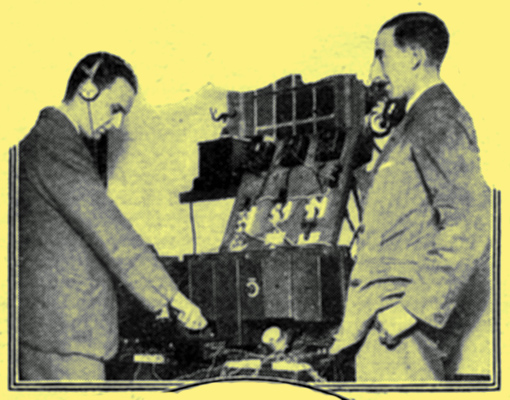
BBC engineers controlling a simultaneous broadcast item.
5XX definitely gave an alternative service to a great number of listeners. Of course, it introduced broadcasting itself to as many - to those outside the service area of any of the nine main and eleven relay stations. Except to London and to SB items, it really was an alternative. Unfortunately, its long wave, so useful otherwise, involved the necessity for change of coil, and that seems beyond the inclination of many listeners.
The Regional Scheme
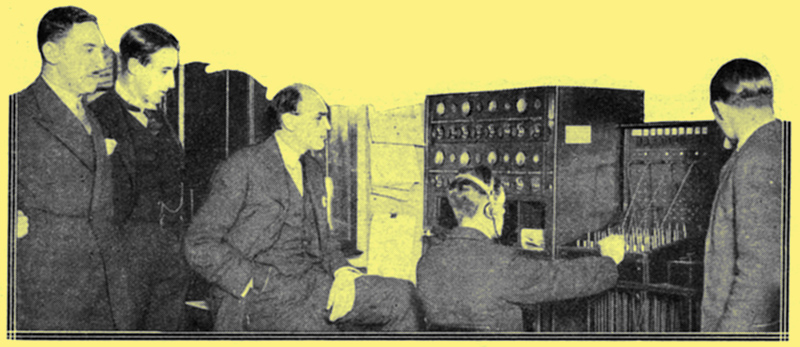
The bottom illustration was taken at the Glasgow station, and shows Sir John Reith inspecting a control-room switchboard.
Alternatives which depend on an operation of that kind did not, therefore, carry us as far in practice as on paper, and had, if possible, to be avoided when a really comprehensive scheme was considered. Unfortunately, all sorts of things conspired to make 5XX an integral part of the Regional Scheme.
It has other things to do as well - along the seaboard, on the sea, in North Wales, in Scotland - but the trouble is that, with 5GB, it provides the ordinary Midland service. The BBC hopes that both stations will be used by listeners in that area, even though the coil change is necessary in some cases. How satisfactory things would have been without this deplorable wave shortage ! For then the Midlands could have had two stations of medium wave, and 5XX might, in due course, - when all the other Regionals Were built, have been almost exclusively employed for specialist services of one kind or another.
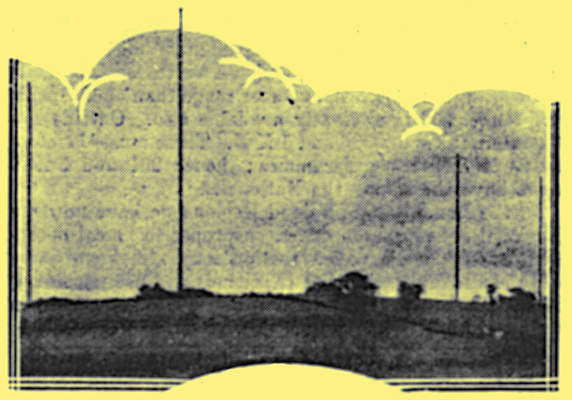
The masts of 5XX and 5GB.
The two London stations are now in permanent operation. The transfer from Oxford Street to Brookmans Park was affected with less inconvenience to listeners than had been anticipated. It is easy, however, to imagine the distress and irritation of those who now simply cannot hear at all. Better aerials will bring the service back for many, but not for all, and there we have to leave a regrettable but inevitable situation.
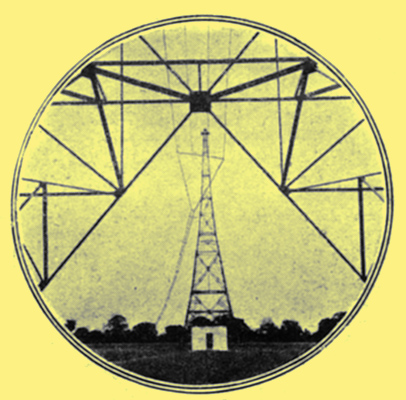
A view of Brookmans Park.
Consequent on a general improvement for the clear benefit of the majority, some individuals and groups are bound to suffer - not, one hopes, irremediably. When the sensitivity problems of the first transmitter at Brookmans Park had been dealt with as carefully and patiently might be, the second began quietly to work and presented new problems of selectivity.
These were somewhat aggravated by the comparative shortness of one of the waves: 261 metres was unusually low for an important station. In fact, it was so low that many listeners congratulated themselves that it did not interfere with their accustomed 2LO and 356, and did not bother about it during the tests.
Then came a shock. The 2LO regular programme was to be transferred to 261 and it had to be found. Most Modern Wireless readers will no doubt be familiar with the explanation, but it may be worth repeating. It is very simple: 261 has a shorter range than 356. Inside 261 range, 356 is obviously available also. Outside 261 the alternatives are 356 and 5XX. These must therefore transmit different programmes; hence 261 and 5XX must have the same - the National.
In the London and Midland Regions we have now the Regional Scheme more or less in proper technical operation, though some reconstruction may still have to be done in the Midlands; 261 (National) and 356 (Regional) in the former, 5XX (National) and 5GB (Regional) in the latter.
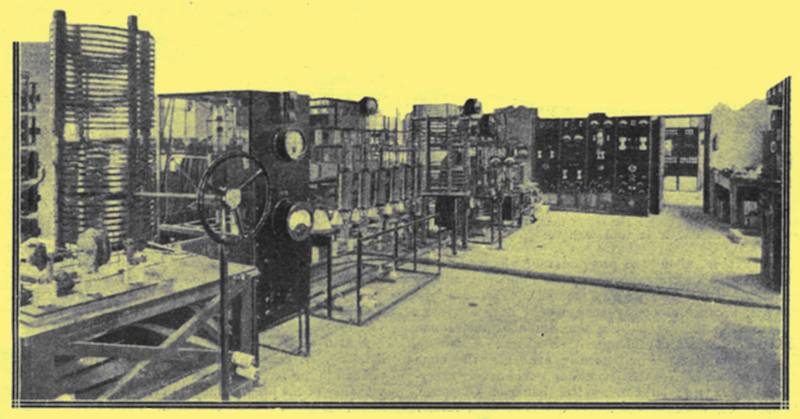
This is 5GB as the announcer says! It is impossible to show all the apparatus in one view, but this gives a good idea of the general layout of Britains most popular broadcasting station. For a long time no talks were given from 5GB, and there is no doubt that this accounts in some degree for the high favour with which its programmes are regarded as an alternative to the more 'serious-minded' stations.
What, then, about the programmes? It used to be said that the task of the programme builders would be simplified if alternatives were possible. This was true enough; because obviously they should have a greater chance of satisfying all the multitudinous tastes and inclinations which attend upon their efforts.
The more items simultaneously available, the more people satisfied. Not that even four would satisfy everyone, still less two; but two is better than one. Of course, it puts more work on them. There is not such a variety of items available that a second wave comes as a positive relief. It is not a dumping ground for things clamouring to get on the ether.
Before alternative, contrasting items are planned and arranged, some general decisions on principle have to be considered. One concerns the hours of the day during which it is desirable or economically justifiable, having regard to the numbers likely to be listening, to run two programmes. Another concerns the nature of the item on the first wave. Some features, though deserving of a place, are of such specialised appeal that an alternative is clearly required, anyhow, in the late afternoon and evening.
Of What Should an SB Consist?
Others have such a general acceptability that it would seem almost absurd to go to the expense (the trouble is not a factor which determines the issue) of running an alternative.
I hesitate to give examples, but every listener could produce a list of, say, half a dozen things which he or she would consider of sufficiently general popularity to stand by themselves. It might include an attractive OB, a popular concert, a live discussion, a St. Martins service. The same six items would not be common to all lists by a long way, but two or three might be.
Embarrassments by way of commitments have already arisen, Some of these will be solved when all the Regional stations are built.
A more satisfactory and systematic planning will then be possible - affecting among other things educational talks now given in the middle of the evening on the London and Midland Regionals as well as earlier on the National and SB elsewhere. A complication seems, however, likely to remain, because of the dual capacity of 5XX, to which reference has already been made, and which leads to such an anomaly in the Midlands as both stations transmitting a children's programme simultaneously.
Then, again, what constitutes a contrast! Light music seems quite a definite and adequate contrast to a talk of any kind, or to a play. But does the same apply to a military band and orchestral concert, particularly if both are interspersed with vocal items? Is chamber music on one wave and vaudeville on the other a good arrangement? Or opera and a debate?
No Unanimity Anywhere
If you compare notes with your neighbours you will not, I think, find unanimity there or, indeed, anywhere. So in one way the programme makers task is simplified, in another it is made more harassing than ever. Some listeners have always appeared more or less satisfied; some will certainly be happier than before; some will be more critical than ever because they will naturally expect more. Alternatives and contrasts are not a panacea. They present very nearly as many problems as they solve. That, however, is all to the good, for it is the inevitable way of progress.
A final word - do let us have discriminating, selective listening. A listener of high position in the land complained to me recently of the excessive offensiveness and vulgarity of the programme at a certain hour on a certain night. It was a play by an author of probably worldwide repute, to whose works those terms could never by any chance apply. And an inch away on his dial was a concert from the Queens Hall!
To match your mood
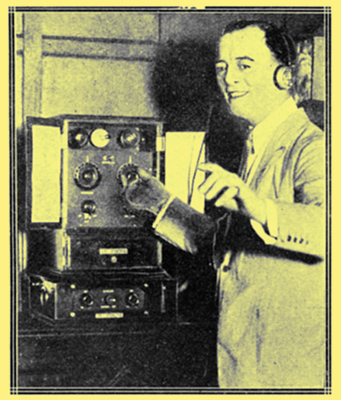
The great advantage of alternative programmes is the fact that different types of entertainment can be selected at will by the listener, so that not only is the set in tune with the station, but the listener is in tune with the programme.
|